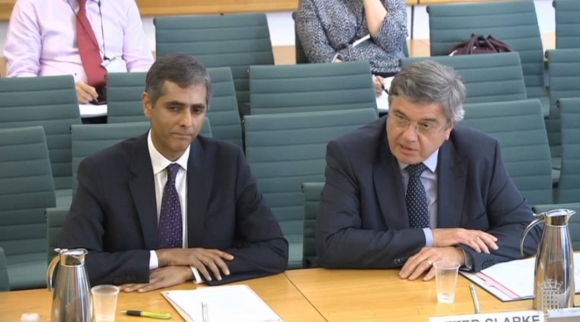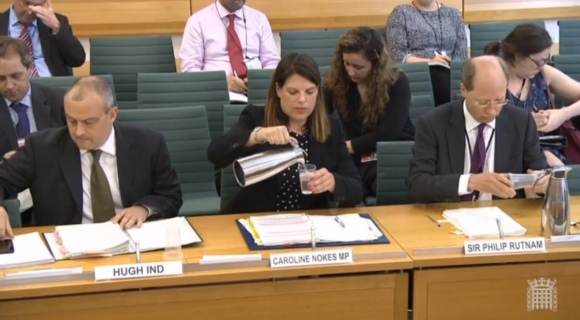Home Affairs Committee Evidence Gathering Session on Immigration Detention - May
Home Affairs Committee Evidence Gathering Session on Immigration Detention - May 2018
On Tuesday May 8th, the Home Affairs Committee took evidence on the subject of immigration detention, in two separate sessions. The first session took evidence from Peter Clarke, HM Chief Inspector of Prisons, and Hindpal Singh Bhui, Inspection Team Leader (Immigration), HMI Prisons. A later session took evidence from the Home Office including Caroline Nokes MP, Minister for Immigration, Hugh Ind, Director General of Immigration Enforcement, and Sir Philip Rutnam, Permanent Secretary.
The Home Affairs Committee is one of the House of Commons Select Committees related to "the expenditure, administration and policy of the Home Office and its associated public bodies". The Home Affairs Committee is chaired by Labour MP Yvette Cooper. At the end of their inquiry, the Home Affairs Committee can be expected to produce a report.
The session can be viewed online and the transcript can be read in full here with submitted written evidence.
A shorter summary or ‘digested read’ of the Home Affairs Committee session can be read on our website (to be uploaded soon).

Session One: Inspectors give Evidence
Speaking: Peter Clarke, HM Chief Inspector of Prisons, and Hindpal Singh Bhui, Inspection Team Leader (Immigration), HMI Prisons
Peter Clarke of HM Chief Inspector of Prisons describes what most concerns him about the operation of detention: "The biggest issue is the uncertainty, the distress that is felt by many detainees because of the lack of clarity... They don't know how long they will be there for.”
Hindpal Singh Bhui of HMI Prisons Inspectorate: “We’ve been concerned about the level of vulnerability of detainees. We’ve been concerned about is the number of deaths in detention. They have risen very markedly, including self-inflicted deaths.”
There were 23 people held in Harmondsworth for more than a year in 2017. Chair YC asks what are the reasons that people are held for extended periods of time.
“There are issues around travel documentation, issues around late appeals, there are issues around efficiency of Home Office caseworking.”
Hindpal Singh Bhui blames the fact that casework is not done before the end of someone’s sentence in prison even when they are supposed to be, for the reason why people are held for extended periods of time in prison.
“There are a number of people who are waiting for asylum claims to be dealt with.” He refers to cases of people held in an IRC waiting for 7 months and 12 months for their asylum claims to be dealt with. When asked by Chair he says that yes he finds this shocking.
Peter Clarke says that they inspect against International Human Rights standards and not against compliance with Home Office policy. He says this can cause friction with the HO.
He describes receiving more pushback against and resistance to the findings of their report by the immigration enforcement part of the Home Office than any other part of their inspection work. Last November they had 12 outstanding improvement plans. There are now 16 outstanding.
“If I have this degree of difficulty getting a response [from the Home Office] what must it be like for the detainees.”
As part of National P Mechanism, Peter Clarke agrees that there should be a time limit on immigration detention. He believes it might increase timeliness with casework. Hindpal Bhui believes that the lack of a timelimit doesn’t put enough pressure on the Home Office to casework quickly and efficiently.
Hinpal Singh Bhui on review of mental health for Shaw Review found that “the longer people are in detention, the worse mental health problems become and that there were significant and serious problems with mental health in detention.” Believes that suicidal ideation may be linked to length of detention.
Peter Clarke: “The fact that some 50% of people brought into detention are at some point released, suggests that screening is not as effective as it could be.”
Hindpal Singh Bhui: “The number of people who are vulnerable in detention doesn’t appear to have reduced greatly. When we inspected Harmondsworth last year about 30% were considered to be level 2 or above in terms of vulnerability. In Yarl’s Wood it was 1/5th. There are large numbers of people that the Home Office itself considers to be vulnerable in detention. In some cases it can be very serious. Looking at Harmondsworth, we took a sample for 10 Rule 35 cases, 9/10 cases had evidence of torture yet every one of those people continued to be detained. There are certainly people who are vulnerable in detention and we haven’t seen evidence of that being reduced.”
Hindpal Singh Bhui says it’s a concern that these vulnerable people are not being picked up by initial screenings but that he doesn’t know why that’s the case.
He says that he can’t recall an inspection where they haven’t had concerns about the level of detail and quality in Rule 35 reports. Without good evidence, it’s difficult for the Home Office to make a decision on detention.
Hindpal Singh Bhui believes that Rule 35 reports are only being engaged when torture is involved: “While torture is only one of the reasons why Rule 35 reports might take place, almost all of the Rule 35 reports we see are about torture. In a detention centre recently, 60 people were at risk of self-harm, half of which were at such risk they were under constant supervision – yet there were no Rule 35 reports on suicidal ideation.
“Since the Adults at Risk policy came in, the number of successful Rule 35 reports has gone down. I guess this can only because there is something within the policy that mitigates against releases taking place. There were 30% releases, it’s gone down to 10% or 15%.”
Paul Clarke on the abuse by G4S guards at Brooke House: “When poor culture infects a unit in a large organisation usually that is due to lack of intrusive and effective first line supervision. What we saw on panorama, were first line supervisors taking part in poor behaviour.”
Stephen Doughty MP: “The Home Office has made a decision here to extend the G4S contract at Brook House without you having gone back to Brook House [for an inspection] while there is a review ongoing [the Kate Lampard review]. That is quite concerning.”
On drugs in detention being a rising problem: “It could be because of the length of detention, the despair that people talk about in immigration detention, levels of mental health issues.”
Douglas Ross MP: “How effective do you think the complaints procedure and the whistleblowing are? … The evidence we’ve received that [abuse] was surfacing, just not to the level that you could write it in black and white that this is happening. Yet, less than a year later, because an undercover reporter went in, it was verified. So there must be something to do with the confidence of speaking to you – either detainees or staff members – I’m getting a slight resistance from you where I would expect you to accept this as a failure and to address that.”
Sarah Jones MP raises the letter by Home Secretary Amber Rudd "Given that it is unlawful to be holding people without a realistic prospect of removal, what’s going here when the Home Secretary is talking about all these people being held?"
Issues of provision of mental health services is raised. Peter Clarke says that an “uptake in concerns [about mental health] is a concern to me.”

Session Two: Home Office give evidence
Speaking: Caroline Nokes MP, Minister for Immigration, Hugh Ind, Director General of Immigration Enforcement, and Sir Philip Rutnam, Permanent Secretary.
On Windrush, Caroline Nokes: “What is clear from our initial investigations, is that we have yet to identify anyone who has been removed incorrectly but it is very clear that people have been [wrongfully] detained.”
Looking at anyone over the age of 45 (born prior to 1973) and at particular nationalities relevant to the Windrush generation, approximately 8,000 cases have been raised that need to be investigated further to see if anybody may have been wrongfully removed.
Hugh Ind says that for the beginning of 2017-2018 his senior team set an enforced removals target of 12,800 people. For 2018-2019 – this was modified to 230-250 deportations per week.
Stephen Doughty MP asks: “Minister, in the last six years, are you aware of any cases of wrongful detention or deportation by the Home Office that go beyond the Windrush scandal?” Caroline Nokes considers this for a moment: “Well I’d have to check…”
Stephen Doughty raises the case of his constituent who was deported to Somalia even though he possessed an expired British passport and was a British citizen. He asks the panel have there been cases of wrongful deportation? Hugh Ind says yes, there has been a handful – about five. On wrongful detention, Hugh Ind says using the compensation given out through the courts, he would say there is a “deep problem”.
When Caroline Nokes is asked about whether she would consider looking closely at the issue of wrongful detention: “I think it is really important when it comes to detention, that we do our utmost to get it right. We continually review the suitability of people in detention.”
Caroline Nokes is asked why G4S has been given a renewed contract: “I think its important to look at it in the round of the Stephen Shaw review and the Lampard review – it is a long contract (10 years) and we wanted to have a full reprocurement process so that we could issue the procurement in light of recommendations of Shaw and Lampard…. [The reviews haven’t finished yet. We have extended the contract] because we have to have someone operating the detention centre at Brook House. G4S are the incumbents in the role – there would be, out of necessity, a difficult and lengthy transfer if it was awarded to someone else. That contract comes to an end on the 8th of this month [later corrected to 21st]. It became imperative that we resolve this matter so we could offer a full reprocurement.”
On Immigration Removal Targets, there was a great deal of confusion and going over of semantics. Chair Yvette Cooper says “The problem with all of this is that you are playing games with us. It is like: If we don’t use the right word in the question, its ok for you to not give us proper information. So if we say target, you now call it an ambition, its ok for you to basically say ‘well ok, we don’t have to give you that information. That’s the problem: it all feels really slippery. Because of the way you are responding to our questions, because of the way you keep ‘slip-sliding’… it makes it very hard for us to have any confidence in any of the information you are giving us and to not think that actually you might be hiding something because we didn’t frame the question in the right way.”
Stephen Doughty MP: “What on earth is going on in your department if we cannot get an answer to the most basic questions?... These are issues that have been repeatedly raised with your department… and you still can’t provide us with an answer. The officials in your department don’t appear to know.”
Caroline Nokes when asked on this issue “I think it’s really important that we change the culture in the Home Office. I am very conscious that this is a large department that is affecting people’s lives every single day. It is to me extremely important that we are able to give good decisions in a timely fashion.”
Stuart MacDonald: “You’ve echoed the former Home Secretary’s comments about the need for a change of culture in the Home Office and yet you’ve stuck your neck out in support of net migration target and in defence of the hostile environment. How can there be any change in culture when these two pivotal policies remain in place and at the centre of immigration policy?”
Stuart MacDonald on the net migration target of the 10,000s “It’s completely unsustainable. It’s a number that’s been plucked out of thin air.” Caroline Nokes says “It’s a number that’s been endorsed by the electorate in three separate general elections.”
On Immigration Detention: “The overwhelming evidence we have received to the inquiry so far is that there is a pretty shameful number of vulnerable people in immigration detention and what was most alarming about the evidence sharing session we just had was that the Adults at Risk policy that was introduced by the government has not improved that, the evidence was that the number of Rule 35 notices that are refused has increased. How has that happened?”
Caroline Nokes says that “The Home Office has to consider all the facts and the immigration history and the likelihood of detention resulting in a removal should that be the appropriate course of action.”
On Rule 35 reports she says that "the average time for a rule 35 report being raised by a medical practitioner and subsequent reply in average was 2.7 days, with the longest wait 27 days. I am inclined to agree with you that 27 days is far too long, but the average is 2.7."
When asked how she can see it appropriate that victims of rape and gender-based violence are being routinely detained, Nokes replies that "we have to consider Rule 35 reports in light of the immigration history and the likelihood of securing a removal."
Hugh Ind says that "The adults at risk policy as a whole I think is not perfect... but it is certainly an improvement on what went on before the adults at risk policy."
Stuart McDonald asks why the Government have pushed ahead with introducing a new definition of torture without waiting for Stephen Shaw’s review. Caroline Nokes says in response that the Stephen Shaw review has been received by the Home Office and is being reviewed. She says that "[Stephen Shaw's Review] has only been with us for I think fewer than two weeks. The Government will be publishing it and responding to it in due course."
Chair refers to a woman released from detention after 9 months. Caroline Nokes says that presumably she wasn't complying with immigration restrictions. Chair: "What does that mean? If somebody misses one report or something, we think, “We will lock them up for 9 months instead”?"
Hugh Ind says that individual cases of people mistreated within the system do not necessarily show the whole picture that is available. Chair Yvette Cooper says that “We have loads of them. That is the problem. We have loads and loads and loads. … We have a blind detainee at risk of self-harm detained for over a year, a wheelchair user who tried to set himself on fire, held for 15 months, month after month after month. That is what is so shocking about these cases. There are so many of them.
Hugh Ind says that “A smaller proportion are asylum seekers are now [being detained] and the only asylum seekers held in detention will be those who have claimed asylum after they were detained for removal for another reason or they represent a public protection issue. That is a change in the last year or two.”
Naz Shah: "I feel it is an insult to this Committee for you to appear before us, given the amount of scandal, given we have had a resignation of a Home Secretary, to be before us not having some of the most basic details to hand for some of the questions that we have asked."
In response to questions on a time limit on detention, Caroline Nokes says: "there is a level of concern that were we to have a time limit, wherever it was set, those in detention might seek to frustrate the removal process up to the point that they were released." She refers to 28 days as an arbitrary number.
Caroline Nokes on mental health of detainees says "I accept that detention in itself is going to impact upon somebody’s mental wellbeing, which is why we encourage those for whom voluntary return is an option to take that."
Hugh Ind says that "About 35% of those in immigration detention are foreign national offenders." When asked what proportion of those people are classified as "high-harm offenders" he responds "That depends on your definition of high harm."
On the Windrush scandal Nokes says "I would like to reassure the Committee that we have looked very closely at the detention estate and have ascertained, with one exception, that there are no people from the Windrush generation currently in detention."
John Woodcock refers to people "being detained and facing removal for often minor errors in their tax submissions for which HMRC are not seeking enforcement action." Nokes says that culture change is required: "It is not about using rules to have a “computer says no” mentality."
Sarah Jones raises the leaked Amber Rudd letter where she refers to beds "being blocked by illegal migrants that we have no realistic hope of removing from the country." Caroline Nokes says she cannot answer for the former Home Secretary.
Sarah Jones talks about the differences between being detained in prison and in immigration detention, in regards to accessing phones and internet. Hugh Ind: "I do not think they prevent somebody in a prison from pursuing their immigration case. It might make it more difficult" Sarah Jones says this is semantics.
On Immigration Bail, Caroline Nokes says “It is no longer a requirement of immigration bail for us to provide accommodation. That does not necessarily mean that people would not have the ability to find accommodation for themselves.” And refers to people staying with family. When asked about those without family and whether they just stay in detention, Nokes says “There is always the possibility of a voluntary return to the country of origin.” The Chair responds by saying “You are back to, “Let us just have any incentive to get them to leave the country”.”
Chair: “You have this vortex. You have someone who is in a detention centre, in an immigration removal centre and has been granted bail subject to having accommodation. However, the other bit of the Home Office will not allow them any emergency accommodation because they are not destitute. What is this individual supposed to do?”
She refers to the Home Office guidance: ““Detention is based around shared facilities (bedrooms, shower rooms and dining rooms) which is not dissimilar to emergency accommodation with lack of liberty being the main difference”. Lack of liberty feels like a pretty big difference”
The Chair concludes the session.




